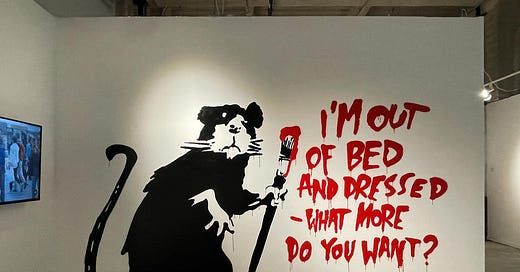One would think priorities would be easy to carry out because, well, they’re priorities.
Except that’s often not the case. Sometimes we just say our priorities are priorities. We don’t make them priorities.
I was recently in a conversation with my friend Sarah Grace. I asked her if she’d ever wanted to sing in a band, and she said, yes, she did—and, in fact, she’d even taken voice lessons.
“How about you?” she asked.
I was the kid who stood at the back of all of my grade school music classes and faked singing. When life has called on me to sing—think “Happy Birthday”—I often mumble my way through the song. I am a classic inhibited singer, but I’ve been feeling this desire to sing, and to sing regularly, to have music in my body at the cellular level.
I told Sarah Grace I wanted to take voice lessons, but I didn’t have the time.
“Of course you have the time,” she said. “It’s just not a priority for you.”
I flinched a bit at this because I am pretty damn busy. I’m an admitted (and joyful) workaholic. I only have an hour or so of down time at the end of a hectic and cluttered day that starts at 5 a.m. I’ve tried to squeeze in other things, like singing lessons, and failed.
“No, I just don’t have the time,” I insisted.
“No, it’s just not a priority,” she insisted.
“I don’t have time” means “It’s not a priority.”
The more I thought about it, she was right. I’ve gone so far as to find a voice teacher. I’ve also talked to my friend Jim about how he sings in a church choir on Sundays—not because he’s religious but just to sing. If singing was really a priority, I’d decide to cut back on something else—even writing—to make room for a voice class or a Sunday choir.
“‘I don’t have time’ means ‘It’s not a priority.’ We always have time for what matters to us,” said time management guru Laura Vanderkam (who also writes novels).
In fact, Vanderkam has an interesting exercise. Instead of saying, “I don’t have time,” she says we should say “It’s not a priority” as a way to think about what’s truly a priority in our lives. So instead of saying “I don’t have time for voice lessons,” I’d say, “Voice lessons aren’t a priority.”
Say this to yourself for anything on your list that you’re not doing, whether it’s writing, organizing your closet, or exercising. Vanderkam gives examples like, “I don’t go to the doctor because my health is not a priority” or “I don’t call my parents because my parents aren’t a priority.”
See if you can identify if your priorities are really priorities and ask yourself this question: Are your priorities guiding your time, or are you allowing secondary things to become priorities?
I actually feel like I’m not making my writing quite the priority I should. I often let myself answer emails in my key writing time instead of blocking off time for writing and keeping it sacred.
That’s as much because of the load of email as it is a struggle with my own doubts about the value of my writing.
Belief = priority. Belief = action.
Because Accountability Write-ins!
I’m hosting an ongoing series of “accountability write-ins”—weekly gatherings to help people set goals, join a community of support, and … write—just write! (That’s the name of the class: “Write! Just Write!”).
Students tell me they’re getting writing done way beyond what they usually do.
"I am thrilled! This is the kind of day when I would have said, ‘I’m too tired, today was too crazy, I’m a half hour late anyway, just skip this evening’s writing.’ But I didn’t, and I just wrote 5 big pages from the photo prompt without stopping that are fun, imaginative, and fantastical, and I understand much more why commitment and ‘just doing it’ IS the work! Thank you."
Our sessions occur on Zoom, so you can join in no matter where you are.
Here’s how it works:
I’ll start each session with a short talk on writing—some thoughts on developing a creative mindset, overcoming creative obstacles, or writing craft topics.
I’ll provide an optional writing prompt, and …
We’ll write!
At the end we’ll do a check-in on our goals, and I’ll answer writing-related questions at the end of each session.
Because Writing with Vulnerability
I believe that writing with vulnerability is more important than any craft tool because being vulnerable is how we connect with others, so writers who risk vulnerability tend to write stories that are the most compelling.
A good story occurs when an author travels, or even plummets, into the depths of vulnerability and genuinely opens his or her soul in search of truths that otherwise go untold.
Join me in a live, two-hour class, Five Things I’ve Learned about Writing with Vulnerability, on May 19 and learn about what happens when writers share the most difficult parts of their story in service of deeper truths.
End notes
What I’m reading: Or re-reading, rather. I’ve been dabbling in a memoir for the last four years or so, and the idea that sparked the idea for the memoir was Maggie Nelson’s Bluets. It’s memoir as prose poem. I love its structure: a series of 240 loosely connected “propositions” that give the reader an intimate connection with Nelson’s thoughts.
What I’m watching: One of my favorite TV series just dropped its next season. Hacks. I love it for the humor (of course). I love it for its commentary on age, both old and young (a Joan Rivers-like comedian is paired with a Gen Z writer in an unlikely working friendship). I love it for its feminist commentary. I love it for its commentary on Hollywood, creativity, business, and soda dispensers in your kitchen.
What I’m listening to: A friend of mine hosted the most interesting afternoon of music. He commissioned two members of the Left Coast Chamber Ensemble, a flute player and a cellist. They played everything from Bach to modern, experimental music, such as Kaija Saariaho, a Finnish composer known for combining acoustic instruments with electronics and prerecorded sounds. I was enraptured.
What I’m photographing: To know me is to know how much I like junk. Objects in states of desuetude. Rust as expressive art (I even wrote a 100-word essay about it years ago).







Grant, from one" admitted (and joyful) workaholic" to another, I love this piece. I've often reframed "I don't have time" to "I won't make time," which sounds more defiant than "It's not a priority." I'll go with your suggestion!
Oof, “it’s not a priority” is a powerful reframe. Especially when I think of what I am finding time for… Bluets is coming up on my tbr - excited for it!